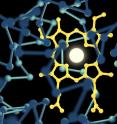Engineering the P450 enzyme to perform new reactions
Enzymes, the micro machines in our cells, can evolve to perform new tasks when confronted with novel situations. But what if you want an enzyme to do an entirely different job -- one that it would never have to do in a cell? In a recent report published in ACS Central Science, researchers show that they can mimic nature and perform evolution in a test tube, developing enzymes that can perform brand-new chemical reactions. Frances Arnold and coworkers explain that although humans aren't that proficient at designing new enzymes, nature does it all the time. By using an engineering strategy that mimics natural evolution, however, scientists can optimize enzyme function for a myriad of applications.
Cytochrome P450s are one example. They are found in many living systems, and in humans, they metabolize drugs and protect against the negative effects of toxins. Arnold and coworkers have noted that changing the amino acids near the active site of a P450 can completely change which chemicals it interact with, and thus change which reactions it can catalyze. In this report, the team sought to train a previously identified bacterial P450 mutant to perform a chemical reaction of interest to the pharmaceutical community.
The researchers trained the previously identified enzyme variant to make new C-N bonds (as in aziridines). The product of the aziridination reaction is desirable because it is easily turned into many other types of chemicals. Arnold explains, "This chemistry is well known to human chemists, but unprecedented in the biological world. Given the right reagents, however, nature easily learns how to do it."
Source: American Chemical Society
Other sources
- Engineering the P450 enzyme to perform new reactionsfrom Science DailyWed, 22 Apr 2015, 16:00:36 UTC
- Engineering the P450 enzyme to perform new reactionsfrom PhysorgWed, 22 Apr 2015, 12:00:23 UTC
- A 'frozen reaction' as key to eco-friendly chemical catalysisfrom PhysorgWed, 22 Apr 2015, 10:30:23 UTC
